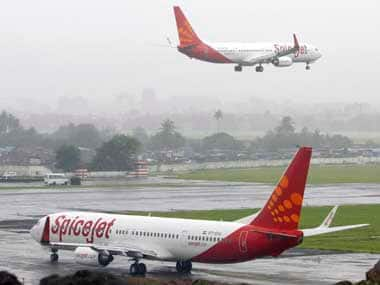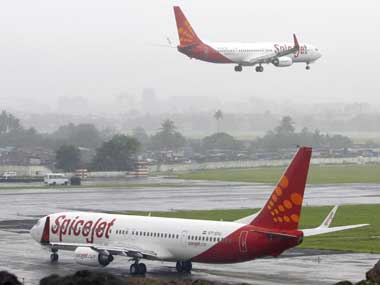New Delhi: SpiceJet’s troubles may just be beginning. Not only have the chief commercial officer and now the chief executive officer of the low cost airline put in their papers in quick succession, this virtual collapse of top management comes at a time when ultra low cost Malaysian carrier AirAsia is preparing to begin operations from SpiceJet’s home turf-Chennai-by the end of the year.
Did the prospect of unprecedented fare war hasten the departure of these two gentlemen, on the back of a disastrous fire sale of tickets they had launched earlier this year? Also, SpiceJet has been in talks with many potential investors-mainly carriers from the Gulf-and a change in top management at a time when a new strategic investor is being wooed may not be wisest move.
[caption id=“attachment_980327” align=“alignleft” width=“380”] SpiceJet. AFP[/caption]
SpiceJet. AFP[/caption]
Last month, CCO Harish Kutty had resigned and now, an online story by Mint newspaper this evening speaks of CEO Neil Mills quitting. SpiceJet’s spokesperson Preeti Dey termed a query on Mills’ resignation by Firstpost as “market speculation” and said the airline will not respond to such a query.
But SpiceJet is listed on the stock exchanges and sooner rather than later, corporate governance rules will force it admit the CEO’s departure to the bourses.
SpiceJet has been having a tough time on many fronts lately. Its debt has more than doubled to Rs 1,429 crore in FY13 against Rs 650 crore n the previous fiscal while the share price has tumbled by about 13 percent in the last 12 months (as per a note to clients by ICICI Direct) and brokerages expect it to fall further. Then, it has also suffered because of currency volatility because almost 50 percent of its operating costs are exposed to currency exchange risks.
Industry watchers and people within the airline have spoken of various reasons for Mills’ departure. These include differences with the promoters (the Marans) and the MD S Natrajhen, the debacle of the fire sale which only helped exacerbate an already precarious financial situation and the fierce competition mounted by other LCCs, specifically IndiGo. Mills was instrumental in pushing the airline towards a fire sale of 10 lakh tickets which was announced in January this year. Though this has never been confirmed, this sale was one of the biggest reasons for a rift in the top management, with CCO Kutty against the idea.
Impact Shorts
More ShortsAn industry watcher said selling inventory (in this case seats) below cost has backfired any times in the past for airlines. He pointed out that Jet Airways, which is already fighting several battles in its quest for investment from Etihad Airways, began a bloody price war a couple of weeks back. This was followed by SpiceJet and IndiGo almost immediately - put simply, this means advance purchase fares across most domestic sectors are now available at dirt cheap rates. This strategy helps increase aircraft loads but wrecks havoc with yields. Precisely what SpiceJet saw with its fire sale in January.
Whatever be the reason, Mills’ departure could not have come at a worse time, with the airline industry getting further mired in debt and the traditional lean season approaching.
A report by ICICI Direct analysts Rashesh Shah and Sneha Agarwal had pointed out earlier this month that SpiceJet’s rapid fleet expansion (number of departures up 27 percent year on year) when passenger traffic is declining means yields (revenue per passenger) would fall going forward.
“This, in turn, may put pressure on the company’s debt servicing ability. Its debt has more than doubled from Rs 650 crore in FY12 to Rs 1,429 crore in FY13 while reporting losses at the operating level over the past two years. Given the slowdown in traffic, this expansion, we believe, would lead to higher losses over the medium term.”
With rising debt, uncertain currency movements, increasing competition and slowdown in domestic air travel, Mills could not have chosen a worse time to exit. SpiceJet accounts for a fifth of the domestic market. Perhaps it is a wise move for Mills but not for the airline.
)